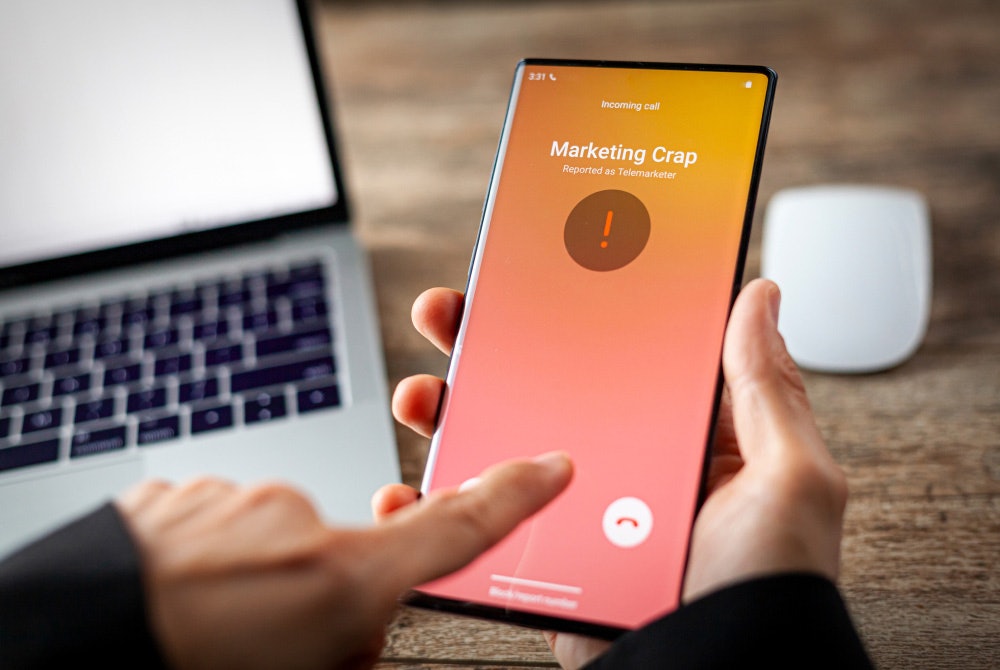- How Scammers Spoof Calls
- How to Identify a Spoof Call
- What to Do If You Pick Up a Spoof Call
- Common Scams Using Caller ID Spoofing
- How to Get Accurate Caller ID Information
Caller ID spoofing is a common tactic used by scammers (and sometimes sketchy telemarketers) to trick you into thinking someone else is calling you. They send false caller information to your caller ID display, so you pick up the spoof call thinking you're speaking to a legitimate company or agency.
How Scammers Spoof Calls
Unfortunately, spoofing an incoming call is relatively easy with several spoofing services available. Star38.com was the first mainstream caller ID spoofing service available, allowing you to place spoof calls easily from their website.
Since its launch in 2004, several similar companies have launched, making it even more convenient and easy for scammers and telemarketers to trick you into picking up their calls. Several apps now let you spoof calls—some even help you change your voice.
Common Caller ID Spoofing Tactics
People use two main tactics when spoofing the caller ID on an incoming call: impersonating a government agency or brand or "neighbor spoofing."
Scammers will often choose genuine government agency phone numbers to use when spoofing the caller ID. They use this tactic when making threatening phone calls, so you pick up the call and then believe the person on the other line. Many scam calls involve someone impersonating a government representative, such as the Social Security Administration (SSA), Internal Revenue Service (IRS), or even the FBI.
Another common tactic is "neighbor spoofing," which involves choosing a spoofed number from the same area code as your phone number. In many cases, the phone number they pick will have the same first 6 digits as yours. This is to make you think it's a local business or person contacting you, so you pick up the call.
How to Identify a Spoof Call
It can be challenging to identify spoofed calls when they come in, but luckily, your telephone company likely provides some protection against them. Many cell networks (e.g., AT&T, T-Mobile, Verizon) have built-in spam/scam detection, so when you receive potentially dangerous or unwanted calls, your phone will show "Suspected Spam" or something similar, so you know to ignore the call.
Here are some handy tips to follow to avoid speaking to a misleading or inaccurate caller who is impersonating someone:
- When in doubt, let calls go to your voicemail account. Legitimate callers and businesses will leave a voicemail if it's something important.
- Don't trust numbers that are extremely similar to your own phone number—scammers use "neighbor spoofing," which uses the same first 6 digits as your number.
- Don't trust unsolicited calls from government agencies. Government agencies will usually send you a letter in the mail if they need to contact you. Also, law enforcement officials will never call and threaten to arrest you—if they want to arrest you, they won't warn you first.
- Don't answer calls you're unsure of—picking up calls will let the scammer know your number is active, which could result in further scam calls coming your way.
- Use a spam blocker—your cell phone service may offer a free app or service, or you can download a third-party app. Note, however, that these services and apps won't block every single spam or scam caller—they do a pretty good job, though.
What to Do If You Pick Up a Spoof Call
If you are tricked into picking up a call after seeing the fake caller ID, it's important to remember that you can't believe everything you're told. When talking to someone you don't know, you should act cautiously.
- Ask to call them back: If the caller says they represent a legitimate company or government agency, tell them you'll call them back. Don't use the phone number they give you; look up the company's website online and call them using that number.
- Don't give them your sensitive information: Most people who use caller ID spoofing are out to get your information. These scams are phishing attacks and can result in your identity and money being stolen.
- Don't believe people who make threats or use scare tactics: Scammers will often threaten you with fines or even arrest to get you to act quickly. They don't want you to think about what to do (or ask someone else what to do); they just want you to do it.
- Don't trust people who ask for payments using non-conventional methods: Scammers don't want you to send them money via credit card or other protected forms that genuine companies or government agencies would accept. Instead, they ask for payment using wire transfer, gift cards, or other untraceable methods that are difficult for you to cancel or reverse.
- Ask questions: Don't blindly trust the person on the other line. You likely have questions about what they're telling you, so don't be afraid to ask them questions. The more questions you ask, the more likely you'll catch them out on a lie.
Act Quickly to minimize the damage
Whether you've given the scammer your information or money, it's essential to act quickly to minimize the damage and recover from identity theft. Call your bank immediately if you gave them your credit card information.
Common Scams Using Caller ID Spoofing
Several scams or spam callers commonly use caller ID spoofing as part of their tactics. Here are some of the most common scams to be aware of.
Social Security Scam Calls
The Social Security Administration (SSA) is one of the most impersonated government agencies when it comes to phone scams. Most of these calls will use fake caller IDs to show "Social Security Administration" or "SSA" on your phone even though they're using other phone numbers.
These Social Security phone scams will involve the person on the other end (i.e., the scammer) saying you need to confirm your information or pay a fee, or you risk:
- Having your Social Security number suspended
OR - Losing your Social Security benefits
It's important to know that your Social Security number cannot be suspended or canceled. Additionally, the SSA will send you a letter in the mail if there's an issue with your Social Security account.
Brand Impersonators
Scammers love impersonating well-known brands, such as Amazon, Apple, and Microsoft, in various scams that use spoofed calls. A typical version of the script involves the scammer pretending to provide tech support for the brand in question.
For example, they may say your Apple ID has been compromised, and they need you to confirm your username and password in order to secure your account.
You may also receive a robocall spoof call from someone claiming to be from Amazon. The robocall will ask you to confirm a recent purchase (usually for a significant dollar amount) or press a number if you didn't authorize the purchase.
Whatever the script, the goal of these scams is to steal your personal information and/or money. If you're ever unsure whether or not it's a scam, log into your account to check the status. For example, if you receive an Amazon robocall about an unauthorized purchase, log into your Amazon account and check your Orders—you'll notice the order in question was never made.
Health Insurance Spoof Calls
Sometimes, telemarketers may use caller ID spoofing when making health insurance or discount medical plan sales calls. They may spoof their caller ID so it looks like your health insurance company calling and then try to sell you a different plan or a medical discount plan that doesn't actually provide the same benefits as a health insurance policy.
Impersonating Family Members
It's less common for caller ID spoofing scams to involve criminals pretending to be your family member, but it's important to be aware of. These scams usually target senior members of the family, who may be more likely to believe what they hear and aren't as educated on these scams as others.
Scammers will use caller ID spoofing to mimic a local phone number or the phone number of someone you know. In most cases, they will target a grandparent and pretend to be a grandchild in need of money. They prey on the good nature of grandparents to steal their money.
How to Get Accurate Caller ID Information
Unfortunately, there's no way to unmask inaccurate caller ID information. The best thing you can do is use spam blockers to help you stop these calls from getting through. Although they're not 100% effective in preventing unwanted calls, they will reduce the number of scam calls you could potentially answer.
Caller ID spoofing services are legal and used by legitimate companies and government agencies, so this problem isn't going away anytime soon. There is a law (Truth in Caller ID Act of 2009) in place that prohibits the use of caller ID spoofing services to "defraud, cause harm, or wrongfully obtain anything of value," however, scammers still get away with it.


Comments